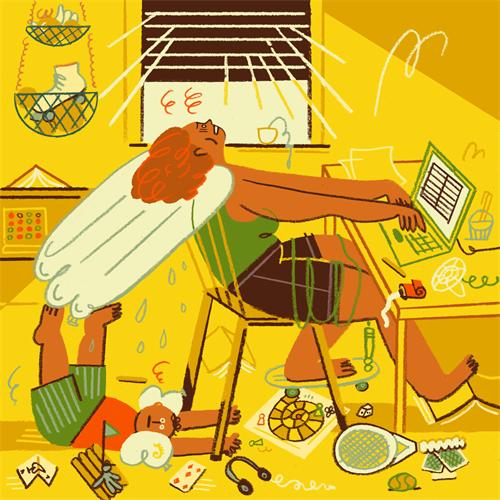Parental Burnout Syndrome: The Silent Epidemic

In an era of rising expectations for parents, parental burnout has quietly emerged as a widely overlooked psychological struggle. It’s not just about feeling “tired”—it’s a deeper, more profound emotional exhaustion. Growing bodies of research suggest that parental burnout is impacting parents around the globe, becoming a silent epidemic hidden in the routines of everyday life.
What Is Parental Burnout?
Parental burnout is a psychological condition that arises under prolonged and intense parenting stress. Its core symptoms include emotional exhaustion in the parenting role, emotional distancing from one’s children, and even a sense of aversion to parenting itself. This condition goes far beyond daily fatigue—it can be agonizing. Some studies have found that its distress level can surpass that of individuals with chronic illnesses or survivors of abuse.
As early as the 1970s, a psychology professor at New York University observed similar patterns in social service workers. Due to the emotional demands and interpersonal pressures of their jobs, many experienced energy depletion, emotional detachment, and feelings of inefficacy—a condition now known as occupational burnout.
Occupational burnout is typically characterized by three main components:
- Emotional exhaustion: Continuous effort without perceived reward leads to overwhelming fatigue.
- Depersonalization: A growing sense of indifference and negativity toward others.
- Reduced sense of personal accomplishment: Feelings of helplessness, low motivation, and even depression.
Parental burnout shares the same roots. Parenting demands constant emotional and physical effort, often without breaks or recognition. Unlike traditional jobs, it doesn’t come with set hours, paychecks, or scheduled time off. It's understandable, then, that many parents eventually feel emotionally depleted.
The Numbers: How Widespread Is It?
Stanford University researcher James J. Gross conducted a six-month longitudinal study involving 2,068 parents. The study explored whether parents had ever thought about escaping their family, imagined neglecting their children’s emotional or physical needs, or felt urges toward psychological or verbal aggression.
The findings were striking: between 8% and 36% of parents reported experiencing some degree of parental burnout. In other words, this is not a rare or isolated issue—it's a shared struggle. In any given group of three families, at least one parent may be teetering on the edge of emotional collapse.
Parental burnout isn’t exclusive to parents of infants or toddlers. It can strike parents at any stage—from caring for babies to managing teenagers. Its primary cause lies in the imbalance between demands and resources—when parenting pressure builds while support remains insufficient, burnout begins to take root.

How Culture Influences Burnout
Cultural context plays a significant role in shaping parental burnout. In individualistic societies—like many Western countries—independence is highly valued. As a result, parents often face the challenges of child-rearing alone, leading to higher rates of burnout due to a lack of support.
Conversely, in collectivist cultures such as many Asian societies, mutual dependence within families is more common. Parents are more likely to receive help from relatives, friends, or community members. While this doesn’t eliminate burnout, such support networks can significantly reduce emotional stress.
How to Cope with Parental Burnout
Recovering from parental burnout is not as simple as taking a hot bath after the kids go to bed. It requires a deeper shift—both in mindset and lifestyle. Here are some practical strategies:
1. Change the Routine into a Shared Experience
The daily grind of feeding, diapering, laundry, and cleaning can drain anyone. But these chores don’t have to be purely mechanical. With a bit of creativity, they can become moments of connection and fun:
- Join a parent-child baking class and turn cooking into a bonding experience.
- Try a “role reversal” day where your child becomes the “parent” and manages the household—letting them understand your efforts and responsibilities.
- Organize regular “family days” with friends—giving your children playmates and giving yourself a much-needed space to vent and share.
2. Activate a “Sustainability Switch”
This is a form of personal incentive—something to look forward to when you’re nearing your limit:
- Let your partner take over parenting duties and take a short solo trip.
- Buy that item you’ve been eyeing but hesitating to get.
- Meet your best friends for a day out and relive the freedom of your pre-parenting days.
These small rewards can be mental lifelines, giving your emotional health a chance to reset.
3. Let Go of Perfectionism
Social media bombards parents with curated images of bento box lunches, intricate braided hairstyles, and homemade cookies—all of which can foster feelings of inadequacy. But the truth is: you don’t have to be a superhero to be a good parent.
- Embrace the fact that you don’t need to be flawless. Showing up, doing your best, and loving your child genuinely is already a powerful form of parenting.
- Understand what’s typical at each stage of a child’s development, and adjust your expectations accordingly.
- Stop comparing your child to others—celebrate their uniqueness instead.
Parental burnout is not laziness or overreaction. It’s a real and valid psychological condition that deserves attention and care. Every parent who works tirelessly for their children deserves to be seen, understood, and supported.
We may not be able to eliminate stress completely, but we can choose not to drown in it. When you feel overwhelmed, allow yourself to say: “I need care too.” That’s not weakness—it’s a mature and brave step toward healing.
After all, only when you take care of yourself can you truly take care of your child.
Recommended for you:







